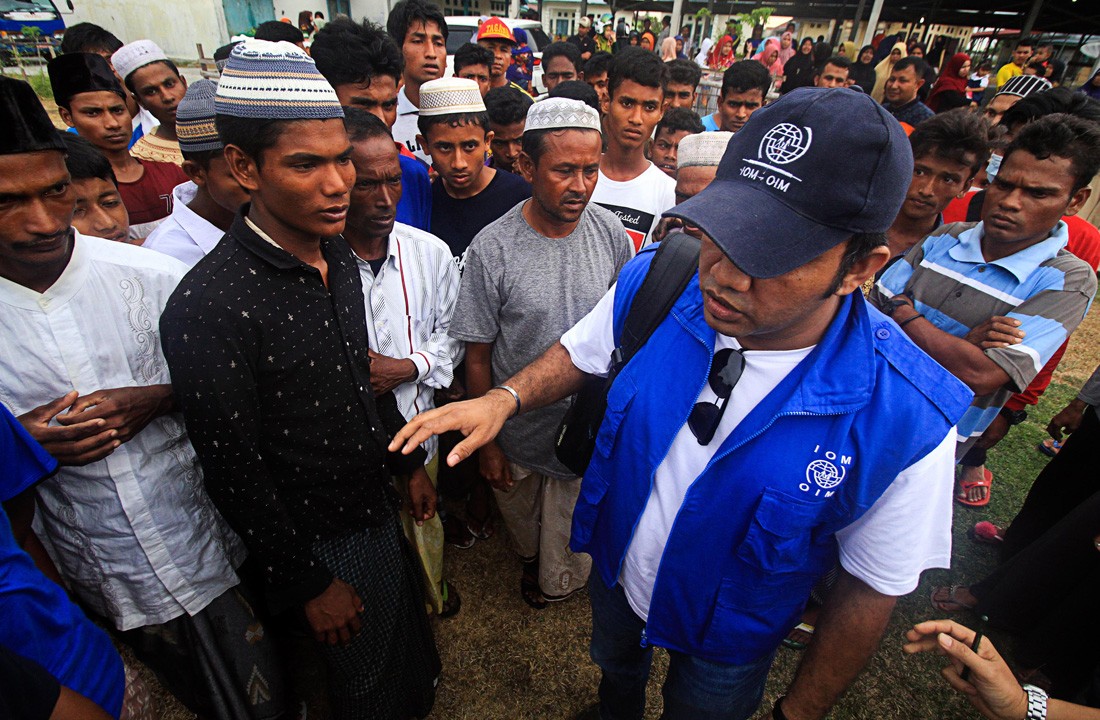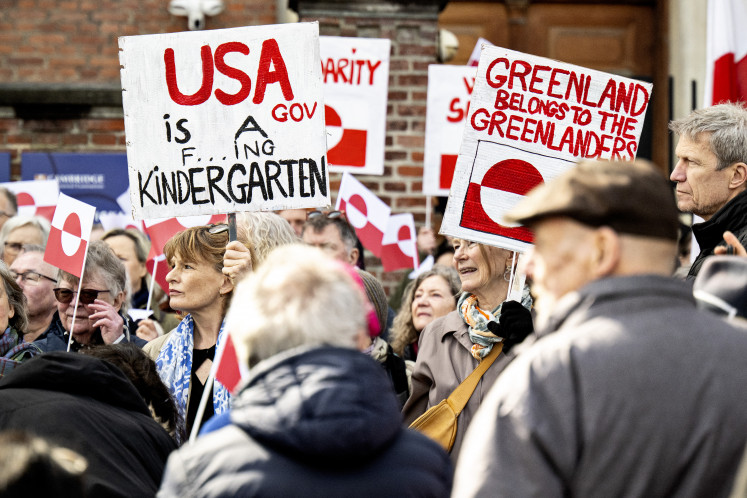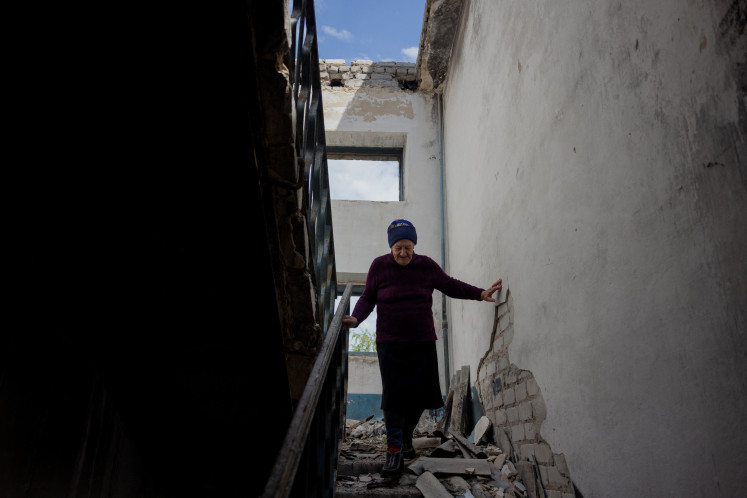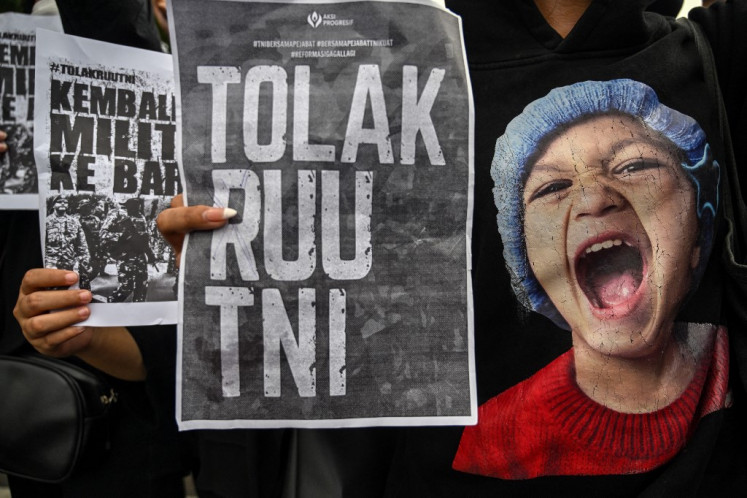Gross rights violations rife in ASEAN's backyard
In the last 10 years, numerous reports and legal analyses have indicated that Myanmar, which joined ASEAN in 1997, has been responsible for crimes against humanity against the Rohingya.
Change text size
Gift Premium Articles
to Anyone
 In humanitarian crisis: An International Organization for Migration (IOM) official (right, with a blue jacket) listens to complaints of several Rohingya refugees in a temporary shelter in Cot Gapu, Bireuen regency, Aceh, on April 21. (Antara/Rahmad)
In humanitarian crisis: An International Organization for Migration (IOM) official (right, with a blue jacket) listens to complaints of several Rohingya refugees in a temporary shelter in Cot Gapu, Bireuen regency, Aceh, on April 21. (Antara/Rahmad)
T
wenty days after the 51st anniversary of ASEAN, the United Nations Independent International Fact-Finding Mission on Myanmar (the mission) reported on Aug. 28 that genocide, crimes against humanity and war crimes had been committed by the Tatmadaw in Kachin, Rakhine and Shan states.
The mission was convinced there were reasonable grounds to hold senior military officials accountable for their genocidal intent to destroy the Rohingya as both an ethnic and religious group in Myanmar, in whole or in part. In the last 10 years, numerous reports and legal analyses have indicated that Myanmar, which joined ASEAN in 1997, has been responsible for crimes against humanity against the Rohingya.
What makes this mission’s report important is its finding of “genocidal intent”.
The mission established that such intent to destroy was pre-planned and under the commander-in-chief, Senior General Min Aung Hlaing, to solve the “unfinished job” of the long-standing Bengali problem. The Tatmadaw’s (military) actions, the Mission argued, met four of the five defined prohibited acts in the 1948 Convention on the Prevention and Punishment of the Crime of Genocide, of which Myanmar is the state party: (a) killing; (b) causing serious bodily or mental harm, (c) inflicting conditions of life calculated to bring about the physical destruction of the group in whole or in part, and (d) imposing measures intending to prevent births.
The enforcement of the prohibition of genocide rests on two pillars.
First, the prosecution against genocide by the territorial state, or by any state that declares genocide falls under the rubric of universal jurisdiction. According to the 2001 Princeton Principles on Universal Jurisdiction, crimes that are harmful to international interests such as genocide, crimes against humanity, war crimes and torture oblige states to bring perpetrators to justice, regardless of the crime site or the nationality of the perpetrators or the victims. ASEAN member states might consider the concept of universal jurisdiction to address the genocide of Rohingya.
Second, the enforcement of the prohibition of genocide is the collective responsibility of states as enshrined under the UN Charter, and within the purview of the R2P (responsibility to protect) doctrine states may intervene in a country where a genocide is taking place with a view of protecting the targeted group. ASEAN member states are thus responsible for preventing or punishing genocide in Myanmar.
The mission recommended ASEAN to engage Myanmar to develop strategies to hold the perpetrators accountable for their acts. The question remains on ASEAN’s non-intervention policy. Because of the principle, ASEAN’s engagement on the Rohingya issue has been conducted behind closed doors without concrete measures to solve the problem.
ASEAN’s narrow understanding of the practice or a blanket application of non-intervention not only hinders achievements in the development of peace, security and economic growth, but also compromises the protection of human rights in the region.
Scholar Eric Kuhonta says there is a continuum of unsolicited to solicited intervention. Military force is considered the highest degree of intervention, with non-interference the lowest level. In between, there are intervention practices such as diplomacy, cooperation, sanctions and humanitarian intervention.
ASEAN needs to revisit the advice of Rudolfo Severino, the ASEAN secretary-general from 1998 to 2002, to consider reducing the non-interference principles on selected issues: genocide, the use of rape as a weapon of war, the worst forms of child labor, the deployment of child soldiers, trafficking in illicit drugs and the curtailment of freedom to practice one’s religion.
President Joko “Jokowi” Widodo has warned that the Rohingya crisis would affect peace and stability in the country as well as economic and political progress in ASEAN if it remained unaddressed. In her response, Myanmar leader Aung San Suu Kyi assured Indonesia that the country was committed to finding a solution to the problem and complying with the recommendations issued by the Advisory Committee for Rakhine state.
On July 30, Myanmar announced the formation of a Commission of Inquiry to investigate allegations of gross human rights violations against the Rohingya. Civil society criticized this commission as another attempt to avoid international oversight. Yet commission members stressed that their mission was not to blame anybody for the violations.
The Rohingya crisis is not an internal affair of Myanmar, but a regional and international crisis. ASEAN’s inaction on the Rohingya issue is evidence of a regional moral crisis.
ASEAN should first, therefore, positively recognize the mission’s report and take steps to ensure accountability for the perpetrators in support of an international justice mechanism. At least, ASEAN member states should refrain from obstructing the international justice system, which deals with the criminal responsibility of individuals.
There is a greater risk when the gross human rights violations in the region or elsewhere proceed unchecked. It means ASEAN allows for anyone living in this region to be the object of persecution on the basis of group affiliations or who they or we are. It is an offense to ASEAN’s core values of diversity, human rights and peace.
***
The writer is a PhD researcher at the International Institute of Social Studies, Erasmus University Rotterdam in The Hague and senior adviser on ASEAN and human rights at the Human Rights Working Group in Jakarta.
The views expressed are her own.










